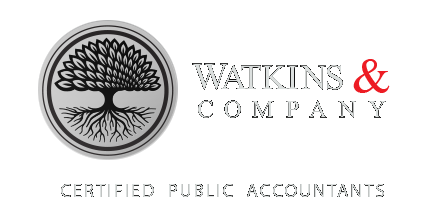How to Set Up and Maintain Organized Financial Systems
Owning a small business has its fair share of challenges. As a business owner, you’re pulled in a hundred different directions each day. One of the most cited difficulties – and yet one of the most vital – is keeping track of financials. The most successful methods all begin with implementing the right systems and tools and end with properly maintaining those processes.
Our team at Watkins & Co supports small businesses every day and we’re here to share some of the most effective business finance organization techniques for small businesses.
Keeping Small Business Finances Organized: Tips and Strategies
Befriend Technology
Digital solutions are available like never before. From automated bookkeeping systems and cloud-based accounting software to spreadsheets, technology saves you valuable time and money through automation. Moreover, accounting technology increases accuracy which is a must in small business finance. Establishing a consistent and organized bookkeeping process with the help of technology enables you to easily track and categorize expenses, income, invoices, payments, tax information, and more! Cloud-based technology also ensures all your financial records are always available and easily accessible in one central location. Most importantly, digitizing all your records on a cloud-based platform protects against physical damage or loss and saves you from having to constantly back up data.
Set Up Regular Reconciliation & Organization
A vital part of establishing a financial organization is consistently reconciling your financial records with bank statements and other financial documents. This can occur on a daily, weekly, or monthly basis. The frequency will largely depend on your business’s productivity and scope. This will help you ensure accuracy by identifying any errors and finding discrepancies. Then you can make adjustments and address these issues before they become major problems.
Monitor Cash Flow
The bane of many small business owners is cash flow, as it is vital for the survival of any company. Tracking incoming and outgoing payments is an essential part of financial organization. An automated system is the best solution for this but it will still require you to keep a close eye. Once your financial systems are established, it will be easier for you to assess the impact of late payments, manage expenses, and make necessary changes. For instance, you may consider automating payment reminders, offering incentives for early payments, and negotiating with vendors or suppliers for the payment terms you need.
Create a Filing System for Paper Financial Documents
Despite the whole shift to technology and digitizing, some paper documents may still be required. You may have paper invoices, receipts, contracts, tax documents, and more. As such, an organizational system for paper documents is just as important as a digital one. Set up a structured filing system for paper documents and train employees on the method. You may decide to use labeled folders or binders to store documents by category or client, depending on your business. Your main goal in this should be to simplify organization and retrieval.
Small Business Financial Organization Strategies
Once you’ve established all the systems above, success all comes down to maintaining and utilizing your systems to help guide your organization’s overall financial health.
Conduct Regular Overall Financial Health Reviews
Perhaps one of the most important methods of maintaining financial records is conducting consistent financial reviews. If your systems are failing then your ability to make informed decisions and adjust your financial strategies is compromised. Analyzing data is what guides your financial decisions so accuracy is paramount. Conducting financial reviews not only allows you to assess your business’s financial health but also indicates where your systems may be failing. Assessing financial statements, cash flow, and other performance indicators can help you identify areas for improvement in your systems and guide potential cost-cutting measures.
Budget and Forecast
Keeping accurate financial records is an essential part of creating a detailed budget. It allows you to plan your spending, set financial goals, and allocate resources wisely. Comparing actual expenditures to your budget can help you identify areas of improvement and potential cost-cutting measures. Additionally, reviewing your organized finances can help you predict future financial trends and guide your ability to adapt to changes proactively.
Best Small Business Accountants
By implementing these strategies, you can maintain well-organized financial records for your small business, enabling you to make informed decisions, plan for the future, and achieve long-term success. When in doubt, contact the professionals at Watkins & Co. If managing your finances becomes overwhelming or complex, don’t hesitate to seek assistance from our accountants, CPAs, tax experts, bookkeepers, and small business accounting professionals. Our expertise can provide valuable insights, organize your financial processes, and ensure compliance with tax regulations.




